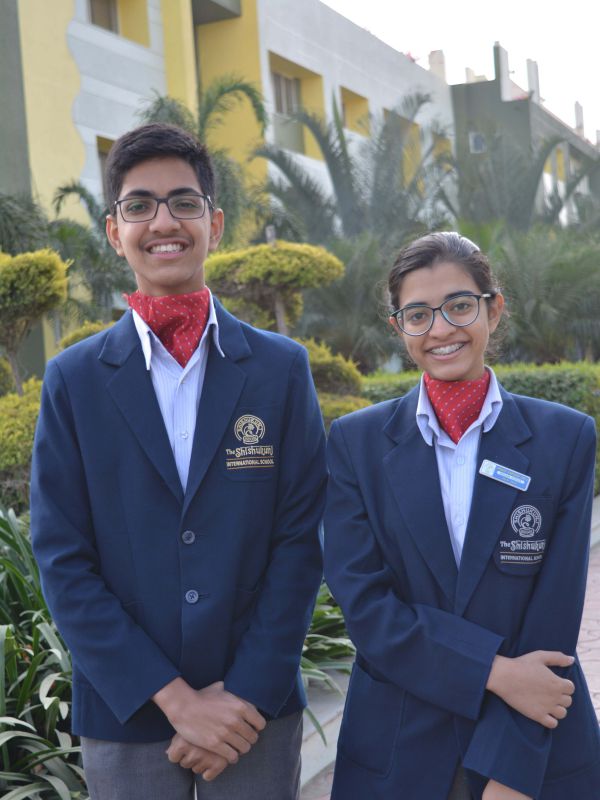Letter from the Chairpersons

Locate. Analyse. Disarm.
Highly motivated by these principles, we, Nitya Vyas and Parv Golwelkar feel honoured to welcome you to the DISEC committee of the Shishukunj Model United Nations 2017.
This committee, which specifically deals with disarmament, has proved to be imperative in establishing global peace.
Issues concerning disarmament have interested us from the very beginning and hence these handpicked agendas-Regulating the Transfer of Conventional Weapons in the Middle East and Preventing an Arms Race in Outer Space-will surely leave you in a brown study.
I, Nitya Vyas, am a 12th grader studying science. I am a typical bookworm with an immense passion for debating and art. My leisure time deals with music, F.R.I.E.N.D.S and sometimes arguing upon the plot holes in the latest seasons of every Marvel TV series ever. I began MUNning in the 9th grade and since then, it has become something I cannot do without.
I, Parv Golwelkar, am an 11th grader, a fitness rogue and a self-celebrated tennis player. I am inclined towards researching about advancements in fields of science and politics. I prefer working ethically or not working at all. Since the first conference I attended few years back, I have been inseparable with these conferences. It gives me immense pleasure to attend these conferences and be a part of the stories they lead to.
We believe that any skill you possess can be aptly utilised and polished through an MUN. We hope to make these three days a fun and learning experience and having said that, we wish you luck and hope that this MUN will give you experiences and memories of a lifetime!
Thank you!
Parv Golwelkar and Nitya Vyas
Chairpersons
GA-1 DISEC
Organ Description
The First Committee of the United Nations, DISEC, deals with disarmament, global challenges and threats to peace that affect the international community and seeks out solutions to the challenges in the international security regime.
It considers all disarmament and international security matters within the scope of the Charter or relating to the powers and functions of any other organ of the United Nations; the general principles of cooperation in the maintenance of international peace and security, as well as principles governing disarmament and the regulation of armaments; promotion of cooperative arrangements and measures aimed at strengthening stability through lower levels of armaments.
The Committee works in close cooperation with the United Nations Disarmament Commission and the Geneva-based Conference on Disarmament. It is the only Main Committee of the General Assembly ennamed to verbatim records coverage.
Agenda One: Preventing Arms Race in Outer Space
Humans undoubtedly are unfathomable entities with their actions driven primarily by desire, fact and emotion. With every domain exhibiting its secret, humans have consecutively either utilised them or destroyed them. Prominently space is one such arena which has been a part of our common heritage since the bang and we are equally responsible for all measures to venture, utilise and destroy it. With the idea of space exploration strengthening its position in our works and brains. A parallel militarisation has been noted and its impact has been witnessed by many. With this issue gaining international importance it becomes a matter of utmost significance to discuss it at a forum such as the United Nations and come up with the needful. A one sided game is been observed by the rich and the ‘militarily powerful’ and harm to our ‘common heritage’ is been inflicted. Not only alterations in the existing structure is demanded but new ideas concerning managing and functioning of military activities is expected. Inability to act and unwillingness to cooperate will surely mean that humans would end up losing one more ‘resource’ and harm the planet and our species as a whole.
Agenda Two: Regulating the Transfer of Conventional Weapons in the Middle East
The Middle East is amongst the most volatile regions of the world. Increased attention is being paid to the threat posed and devastation caused by armed conflicts around the world in many such volatile regions. One of the major rationales of these conflicts is the transfer of conventional weapons. Estimates range from 100 to 500 million military style weapons in circulation, in addition to hundreds of millions more designed for police or civilian use.
Any armaments used in domestic/transnational crime, violations, conflicts or war come under the category of conventional weapons. Small Arms and Light Weapons (SALW) come under the category of conventional weapons too however it doesn’t include weapons of mass destruction (WMDs). These arms are thought to be responsible for 90 percent of recent war casualties. The widespread proliferation of these arms and their indiscriminate use renders them as a national security threat. In addition to that, crime and terrorist attacks around the world use conventional weapons for their attacks and millions of children, political dissidents, peacekeeping forces, development workers and civilians are affected.
The licit and illicit traffic in these are closely intertwined. Arms that are originally exported legally, but are not properly tracked or secured, often fall into illegal circulation. The prevailing laws are not binding and secure enough, hence the Regulation of the Transfer of Conventional weapons in the Middle East is one problem that DISEC needs to find a solution to.